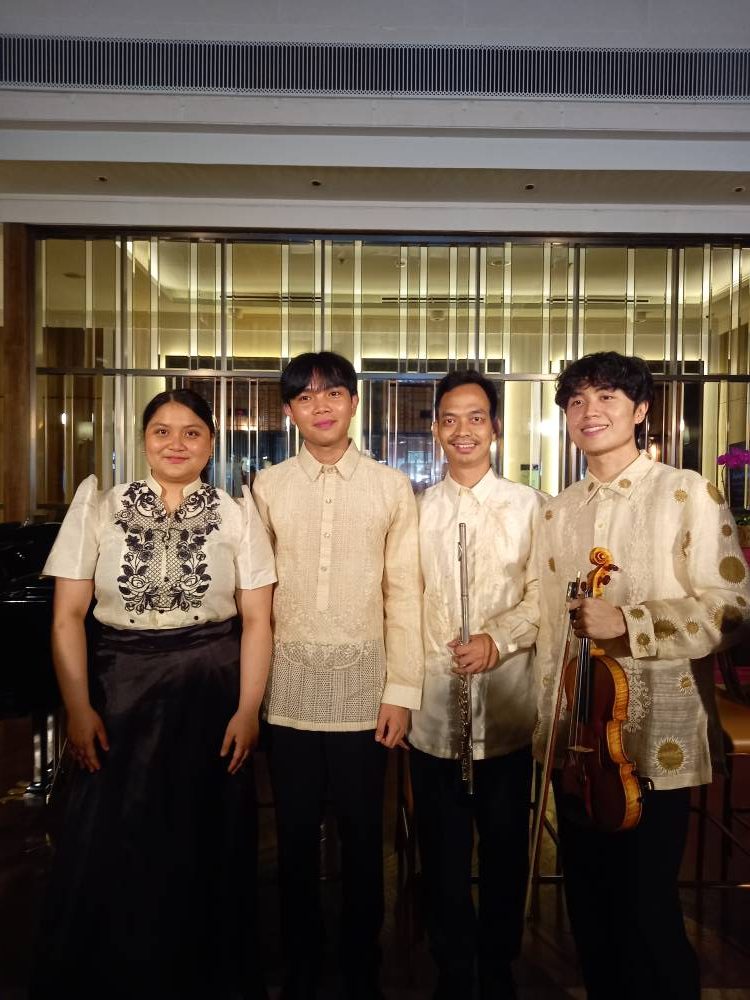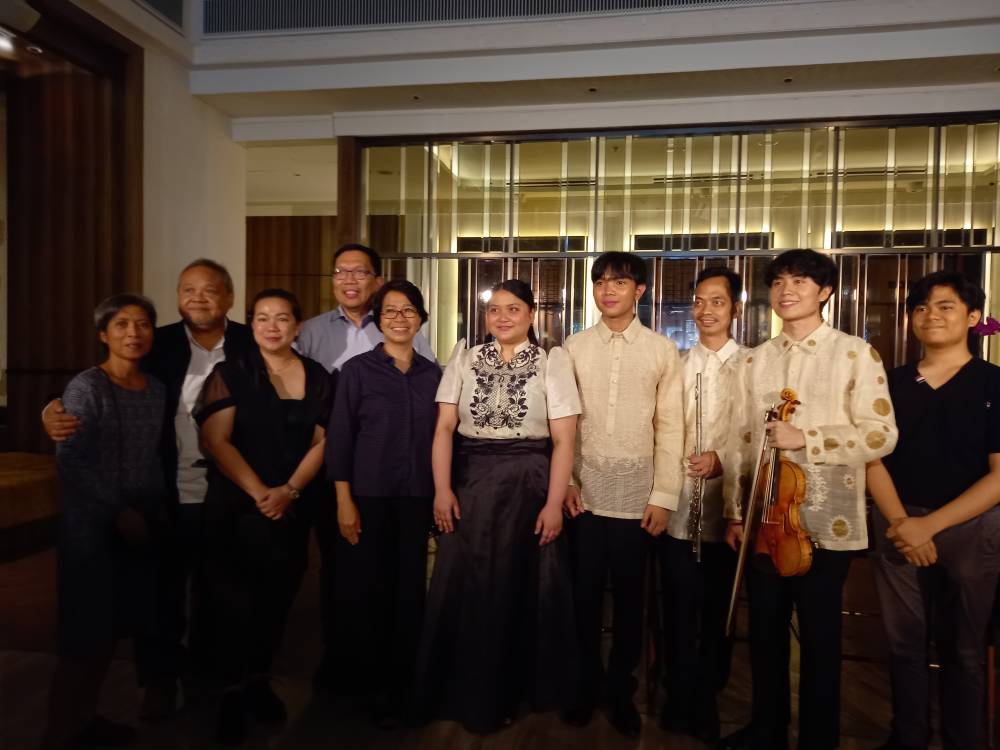Music and dreams: Young scholars return to inspire

Thirty-seven years after the Cultural Center of the Philippines (CCP) last sent scholars abroad for further studies, the country’s leading institution for arts and culture has revived the program with four young musicians determined to not only excel but also make a difference in their chosen field.
Pianist Aidan Ezra Baracol, 19; soprano Lizzie Bett Estrada, 21; violinist Adrian Nicolas Ong, 24; and flutist Mark Kenedy Rocas, 29, were formally introduced by CCP president Kaye Tiñga as the current batch comprising the CCP International Scholarship program in an event held on July 16 at the Admiral Hotel Manila.
“We’re proud that we’re resuming this program at this time,” said Jaime Laya, chairperson of the CCP board of trustees, in his opening remarks. The CCP board provides financial and other forms of support to the scholarship program that aims, as stated in its establishment under Presidential Decree No. 15, to “discover, assist and develop talents in Philippine cultural pursuits, thereby creating opportunities for individual and national expression in cultural affairs.”
CCP vice president and artistic director Dennis Marasigan spoke a bit on the selection of the four scholars, who are all graduates of the Philippine High School for the Arts (PHSA) and winners of the National Music Competitions for Young Artists (Namcya).
He said they went through a process, including auditioning in front of the board and the artistic committee. At the time, the musicians had been accepted to their respective schools abroad and started their studies, so they were chosen in a sense, as Marasigan pointed out, “on an ad hoc basis.”

He then bared CCP’s plans for selecting the next batch of scholars: “We’re institutionalizing the process and we’re actually going to open the scholarship applications by next year with certain guidelines. We’ll be announcing those guidelines in time.”
Meet the scholars
Rocas is on his final year earning a master’s degree in flute performance, under the tutelage of Soo-yun Kim, at the Longy School of Music of Bard College in Massachusetts, USA. The General Trias, Cavite native fondly recalled taking his mother’s kaldero to use as a musical instrument while the marching band was passing by their house during a Holy Week parade. He later started learning how to play a real instrument.
“The only instrument at home was a flute, from my sister who also used to be a musician,” Rocas said in Filipino, adding that he didn’t have toys, so the flute became his plaything. “It was like a never-ending video game. It’s fun. That was enough to inspire me.”
After completing his studies, Rocas said he’ll return home to become a teacher because “gusto kong tumulong sa pagpapaunlad ng musika dito sa bansa (I want to help in making music flourish in our country).”

Ong, who’s pursuing his artist diploma at The Royal Conservatory’s Glenn Gould School in Toronto, Canada, couldn’t forget hearing the sound of violin for the first time when he was 4 years old. He recalled, “I was in a lobby somewhere. There was a TV. Ever since then I’d been asking my parents for violin lessons, but they didn’t let me take them until I was 9 years old.”
By age 13 or 14, he was immersed watching videos of Russian violinist Maxim Vengerov on YouTube and got transfixed seeing Vengerov perform with joy, emotion and love for his craft. He particularly loved Vengerov’s documentary titled “Playing by Heart,” which, for a time, the young musician watched every day.
“I was inspired by his love for music and sharing his love and his belief that it can change a person’s life,” Ong said. That’s why he enjoys performing at fundraisers, such as the one for the benefit of ChildHope Philippines and Museo Pambata.
Classical music
For her part, Estrada said she’s a typical Filipino who grew up on videoke,” whose parents have “good voices.” Her father also took it upon himself to get one of his children into the PHSA in Los Baños, which, like their hometown, Calamba, is located in Laguna province.
The young singer’s first audition didn’t yield a positive result because, she reasoned, “I didn’t know anything about music theory.” So she studied for a year in a special program for the arts in Calamba and asked her choir conductor for music theory. The following year, she auditioned again and this time, she got in.
Estrada remembered her dad not expecting her to sing classical music, thus asking her, “Why aren’t you singing pop songs? Why are you singing these old songs?” And she simply replied, “It’s required.”
She herself didn’t expect to keep singing “those kinds of songs,” but her teachers Camille Lopez-Molina and Pablo Molina did a great job in instilling a love for classical music that the promising soprano now further develops as a full scholar at the Royal Academy of Music in London, under Susan Waters.
Baracol, who likewise studies at the Royal Academy of Music, shared some childhood memories of himself using tin cans and other objects to create sound, as he was “fascinated with rhythm.” Then he started getting piano lessons from his grandmother, a church pianist, and recreated the tunes he’d heard in TV commercials. He got serious with his studies under his “first formal teacher,” Godofredo Areza, “who really pushed me to appreciate the more intricate side of music.”
The young pianist remembered the time he realized he wanted to pursue a career in music during the pandemic, when he started sending out applications to several competitions, both local and international. “That pushed my skill and musical artistry, and I got exposed this larger side of music,” he said.
Baracol, Rocas, Ong and Estrada will headline the Philippine Philharmonic Orchestra (PPO)’s Young People’s Concert on July 27, 5 p.m., at the Rizal Park Open Air Auditiorium. They will perform with the PPO with Herminigildo Ranera as conductor. The concert is free and open to the public.

















